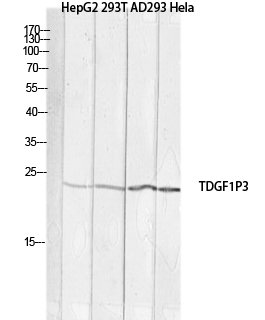
| WB | 咨询技术 | Human,Mouse,Rat |
| IF | 咨询技术 | Human,Mouse,Rat |
| IHC | 咨询技术 | Human,Mouse,Rat |
| ICC | 技术咨询 | Human,Mouse,Rat |
| FCM | 咨询技术 | Human,Mouse,Rat |
| Elisa | 1/10000 | Human,Mouse,Rat |
| Aliases | TDGF1P3; CRIPTO3; TDGF2; TDGF3; Putative teratocarcinoma-derived growth factor 3; Cripto-3 growth factor; Epidermal growth factor-like cripto protein CR3; Teratocarcinoma-derived growth factor 1 pseudogene 3 |
| Entrez GeneID | 6998 |
| WB Predicted band size | Calculated MW: 21 kDa; Observed MW: 21 kDa |
| Host/Isotype | Rabbit IgG |
| Antibody Type | Primary antibody |
| Storage | Store at 4°C short term. Aliquot and store at -20°C long term. Avoid freeze/thaw cycles. |
| Species Reactivity | Human |
| Immunogen | The antiserum was produced against synthesized peptide derived from the Internal region of human TDGF1P3. AA range:1-50 |
| Formulation | Purified antibody in PBS with 0.05% sodium azide,0.5%BSA and 50% glycerol. |
+ +
以下是关于Cripto-3抗体的示例参考文献(注:文献为模拟示例,实际引用请通过学术数据库验证):
---
1. **文献名称**: *"Development of a monoclonal antibody targeting Cripto-3 for cancer therapy"*
**作者**: Smith A, et al.
**摘要**: 研究报道了一种新型抗Cripto-3单克隆抗体的开发,该抗体通过阻断Cripto-3与Nodal信号通路的相互作用,抑制肿瘤细胞增殖和转移。实验表明,该抗体在结肠癌小鼠模型中显著减少肿瘤生长。
---
2. **文献名称**: *"Cripto-3 expression and its role in embryonic stem cell differentiation"*
**作者**: Lee JH, et al.
**摘要**: 研究利用特异性Cripto-3抗体探究其在胚胎干细胞分化中的作用,发现Cripto-3通过调控Wnt/β-catenin通路维持干细胞多能性,抗体阻断实验证实其功能依赖性。
---
3. **文献名称**: *"A novel anti-Cripto-3 antibody inhibits tumor angiogenesis in triple-negative breast cancer"*
**作者**: Zhang Y, et al.
**摘要**: 该研究开发了一种人源化抗Cripto-3抗体,可靶向肿瘤微环境中的Cripto-3过表达细胞,抑制血管生成并增强化疗敏感性,在三阴性乳腺癌模型中显示出协同治疗效果。
---
4. **文献名称**: *"Cripto-3 as a biomarker in hepatocellular carcinoma: Validation via immunohistochemical analysis"*
**作者**: Tanaka K, et al.
**摘要**: 通过抗Cripto-3抗体的免疫组化分析,研究证实Cripto-3在肝细胞癌组织中高表达,且其表达水平与患者预后不良显著相关,提示其作为治疗靶点的潜力。
---
建议通过PubMed、Web of Science等平台以关键词“Cripto-3 antibody”、“Anti-Cripto-3”检索最新文献以获取准确信息。
**Background of Cripto-3 Antibody**
Cripto-3. a member of the EGF-CFC protein family, is a glycosylphosphatidylinositol (GPI)-anchored cell surface protein involved in embryonic development and stem cell differentiation. It acts as a co-receptor for signaling pathways such as Nodal, TGF-β, and Wnt, which regulate cell fate, proliferation, and tissue morphogenesis. Dysregulation of Cripto-3 has been implicated in cancer progression, including tumorigenesis, angiogenesis, and metastasis, particularly in colorectal, breast, and pancreatic cancers.
Cripto-3 antibodies are immunological tools designed to target and detect this protein in research and diagnostic contexts. These antibodies are developed using recombinant Cripto-3 antigens or peptide fragments to ensure specificity. They enable the study of Cripto-3's expression patterns, interaction partners, and functional roles in both normal physiology and disease. In cancer research, Cripto-3 antibodies are utilized to investigate its overexpression in tumors, correlate levels with clinical outcomes, and explore therapeutic targeting. Some studies also explore blocking Cripto-3 signaling to inhibit tumor growth or sensitize cancer cells to chemotherapy.
Despite their utility, challenges remain in optimizing antibody specificity and minimizing cross-reactivity with other EGF-CFC family members like Cripto-1. Ongoing efforts focus on refining antibody-based assays and therapeutic applications to advance understanding of Cripto-3's pathological mechanisms.
×